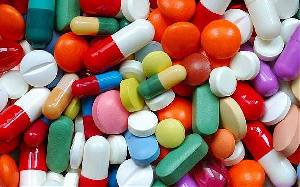- Home - News
- Polls
- Year In Review
- News Archive
- Crime & Punishment
- Politics
- Regional
- Editorial
- Health
- Ghanaians Abroad
- Tabloid
- Africa
- Religion
- Election 2020
- Coronavirus
- Photo Archives
- News Headlines
- Press Release
General News of Wednesday, 27 October 2021
Source: 3news.com
Pharmaceutical companies have stopped giving us drugs on credit – PHFAG
Pharmaceutical companies in Ghana have stopped supplying drugs to members of the Private Health Facility Association of Ghana (PHFAG) because the Association is always indebted to the pharmaceutical companies.
The PHFAG says they are therefore forced to render services to patients who visit their facilities for their services under hardship.
They are threatening to begin a cash and carry system for patients with the National Health Insurance Scheme because the National Health Insurance Authority (NHIA) has refused to pay their claims.
The National General Secretary of the Private Health Facility Association of Ghana, Frank Torblu Richard made the revelations in an interview on the Sunrise show on 3FM on Wednesday hosted by Alfred Ocansey.
“Pharmaceutical companies have stopped giving us drugs on credit anymore because we owe them. We buy the medicine from them and we give it to the patients and we are not paid by NHIA for ten months”, he explained.
“95% or more of our revenue comes from the NHIA. The remaining 5% comes from the services we render that do not fall under the NHIS. Money comes to the facilities when the services rendered do not fall under the NHIS so we heavily depend on the NHIA,” he added.
Mr. Torblu Richard explained that “it’s a straightforward game. We are required to be paid after we have submitted our claims to the NHIA but as we speak, claims submitted are in arrears since 2019. Some in 2020 and in the case of this year, some have been paid up to march, others no. How do providers survive?”
The National Secretary could give the quantum of debt owed by the NHIA but explained that “when we take individual facilities, some are owed GHS400,00, GHS500,00, GHS900,000 and some are even in millions”.
“There are 780 private health facilities that provide NHIS services across the country and all of these are owed by the NHIA.
Impact of debt on medication
Mr. Torblu Richard eluded the shortage of drugs in some private facilities to the debt owed by the NHIA since they do not have money to purchase the drugs.
“Nobody can stand up and walk to these institutions and ask why they don’t have these drugs because they don’t have funds to procure these medicines”.
He explained that “some facilities are having arrears of their workers. That is the situation private health providers have found themselves in and if actions are not taken now, you will visit a private health facility and if it comes to medicines, you would be asked to pay or buy your drugs somewhere”.
Asked what they are doing to retrieve the debt from the NHIA, Mr. Torblu Richard said “we have been engaging them"
“There are some instances that NHIA would drop in a month pay and it has to be shared to electricity, water, among others and we go back to square one”
He added “sometimes they [NHIA] come out and say some of our members have not submitted their claims and that is why we have not paid them. But even if submission of claims is delayed at all, in 2019, what is the problem”.
He further noted that in 2021, some have not been paid until March and that means the system is not working and the claims have become voluminous”.
Entertainment










